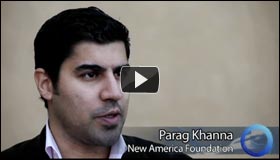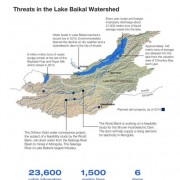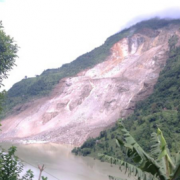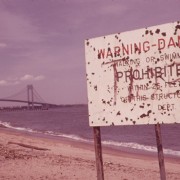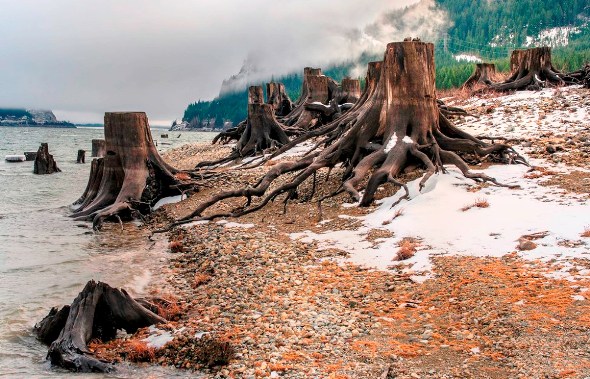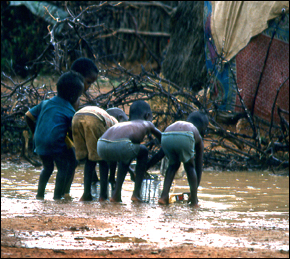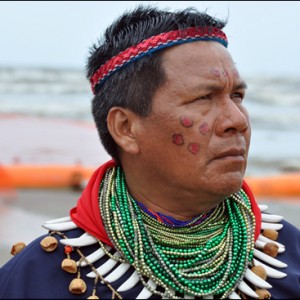Parag Khanna: How Resource Scarcity Will Lead to a New Global Order
Circle of Blue caught up with the senior research fellow for the New America Foundation during the World Economic Forum Global Agenda Council meeting in Dubai in November.
By Circle of Blue
Parag Khanna, Senior Fellow at the New America Foundation in Washington, D.C., researches geopolitical issues. His new book is called The Second World: Empires and Influence in the New Global Order.
The new global order looks more like a global disorder right now. It’s this very complex ecosystem of governments, of corporations, of NGOs, of religious groups and other kinds of actors that are competing in some ways, but also finding new ways to collaborate. That to me is the future of diplomacy and global governance.
Right now, the system as we have it is mostly about countries and governments, but only a few of those are very effective. Think about the G20, for example, and how that’s become so prominent. It’s almost a statement that says, Really only 20 countries know what they are doing or have the capacity to. In fact, even the G20 has a number of countries in it that aren’t particularly leaders, such as Argentina and Italy, and even those remaining 18 or even 15 can’t solve all the world’s problems. So there is this great vacuum of diplomacy, and I try to work on how to fill it in a sensible and pragmatic way.
Borders are constantly changing, and a lot of people are just wedded to the borders that we [know] today because they feel that shifting borders would mean a lot of violence, and learning the names of new countries, and all sorts of annoying things.
In fact, I think that proactively changing post-colonial borders, particularly the ones that have been very troublesome and have been the cause of a lot of violence and justify a lot of them, [and adding] more smaller military industrial complexes around the world would be a very proactive strategy towards mitigating conflict. And actually creating more sensible borders that get us closer to what you might call an equilibrium where the population distribution, in terms of political geography and with reset to resources, is simply better balanced than it is today.
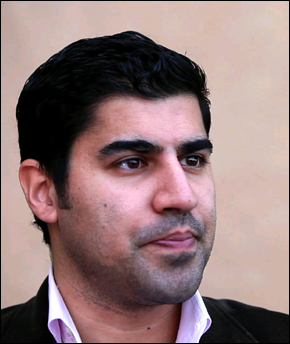
A lot of people don’t think borders don’t matter, but as I always point out, 90 percent of the world’s population will never leave the country in which they were born. So it’s only the ten percent who might even conceivably think that borders don’t matter. For by far the majority of the world’s population they matter a great deal, and again they often matter violently. So we know which borders are being fought over, we know which one could be fought over, [and] we know how natural resources will shape how countries fight over those borders. Particularly if it’s river systems, for example. So I think that finding ways to not just shift borders, but to potentially blend them is a good approach to dealing with these problems proactively.
Again, there are some good examples out there, or at least some positive steps in the right direction. We have work on the Dead Sea-Red Sea canal, for example, in the Middle East. There are new water corridors being created in some parts of the Middle East. There is the possibility of good legislation managed by the World Bank or other entities such as the Indus Waters Treaty, which goes back decades. There is a whole variety of things—we see in Central Asia, a landlocked region, how potentially you could start to exchange water from some countries for electricity and power from others. So there are some ways out there or some models that could be used in other places as well.
Clearly most all political borders are artificial in a sense that they do not track to geology, geography and resources. So the key then is to make sure that political borders don’t stop us from sharing resources in ways that will mitigate conflict…. There is a very identifiable set of places where this is happening…of course all over the world. So this is this global strategy really to think about borders very differently.
The Nile River is a great example because we are having a certain amount of upstream damming of the Nile River as well as downstream increase siltification of the river, and so forth. There [are] a lot of fears from the upstream countries like Egypt and Sudan and other places. And in the Horn of Africa where there [are] a lot of dam projects underway. [Fears] that this is going to have a very drastic impact on them. There are a lot of threats of conflict that have taken place there. So what we would need to see, obviously, is better resource management and water sharing. We would want to see less construction of huge inefficient hydroelectric dams and so forth. That requires a certain amount of expertise to come into the area as well as better diplomacy to take into account the interests of local parties. Right now we don’t have that because we just have acrimonious governments bickering at each other.
Someone needs to come in from the outside and give both sides or multiple sides incentives to cooperate rather than to fight. Countries that might be selling weapons to these others need to say, “…we are not going to sell you weapons in order to fight a war over water that will only result in less water. Right? We’re going to come in and we’re going to use good technology to help make sure water is used sustainably and we’re going to work on cooperative projects that allow for economic development along the river systems so that people all share in the opportunity that river transport and water resources can bring.”
Energy is actually going to be a major driver, water is in a way a form of energy of course, a life-giving force. Demographics is often a key driver of the shifts in borders. I see a shift in at least the mental borders if not the political ones in the Russian Far East where it has largely become Chinese populated. And I think that’s going to spell, in the distant future, a potential shift of the political picture or the map of the world in that area. I see in the Middle East the new pipelines that Kurdistan in building. I see… shifting the borders and potentially creating an independent Kurdistan. South Sudan is actually having a pipeline flow from its territory across Kenya to the Indian Ocean, that will strengthen its case for independence from the rest of Sudan. So one can see how resources play an intimate role, really. Greenland, a lot of people predict, will be the first country born from climate change because it has already voted itself self-governance rights from Denmark.
…access to resources and the potential economic value of those resources really shifts the calculus about who will control borders.
So there [are] a lot of places where access to resources and the potential economic value of those resources really shifts the calculus about who will control borders and the examples that I have just cited span three different continents.
What we will find in a place like Kurdistan is that one does not really have to fight so much over a control of the oil because Kurdistan is a landlocked territory. Therefore, it has to be very friendly with all of its neighbors to actually benefit from the oil. So the countries that are conduits for the exports of Kurdistan’s oil are going to profit just from that and then Kurdistan as well, so I think that there are win-win outcomes in a lot of these scenarios.
…the future of diplomacy is where the .gov, .com, and .org, and even .edu, worlds come together; where you marry expertise with knowledge with the man power and with the regulation and oversight and the financing.
To me, the future of diplomacy is where the .gov, .com, and .org, and even .edu, worlds come together; where you marry expertise with knowledge with the man power and with the regulation and oversight and the financing. All of those elements are brought to the table by these different players, whether it is companies, NGOs, governments or academics. A place like the World Economic Forum where this type of discussion is happening right now, is a very interesting role model…. Where you get coalitions together and hopefully they jump off from here and actually solve some problems at the local level or at the larger kind of scale. But most certainly very few problems today actually get solved without the active involvement of all of those players. That’s a reality that international relations as we think of it today does not in any way capture. I think it is time for us to evolve mentally. This is the book I am going to write.
Circle of Blue provides relevant, reliable, and actionable on-the-ground information about the world’s resource crises.

